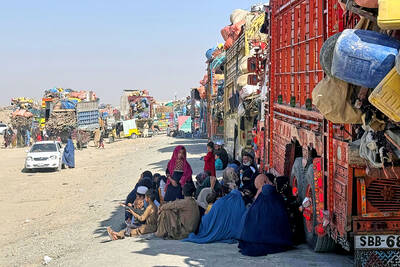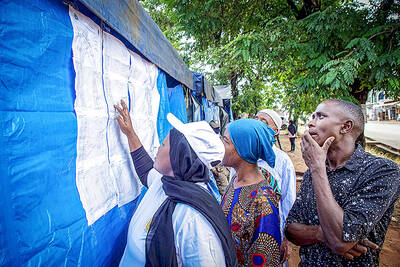Recent signs of openness by Angola’s famously opaque government have been welcomed by political analysts, but the oil-rich country must now turn the transparency talk into action, the same experts said.
Four Angolan ministers and the central bank governor gave an unprecedented press conference for local and international journalists last week, broadcast live on radio and television in a country not used to government openness.
Carlos Feijo, state minister for civil affairs, told journalists that transparency and good governance would be highlights of long-time Angolan President Jose Eduardo dos Santos’ government under a new Constitution adopted in February.
Analysts said the conference was the first of its kind in Angola.
“The conference was transmitted live on radio and television, with a variety of questions from the journalists. It’s a sign that the new government is going to be closer to people,” said Moises Sachipangue of Angola’s state-owned TV network.
“It is a positive sign. This is something that never happened before,” Elias Isaac of the Open Society Institute said. “We have been used, for decades in the country, to have government officials who run away from the press, who don’t speak to the public and who don’t engage with the citizens.”
Dos Santos, Angola’s president for the past 30 years, could extend his grip on power for another decade under the new Constitution, which allows him to run for two more five-year terms.
The one-time Marxist clung to power through a 27-year civil war that ended in 2002, but has faced a presidential election just once, in a 1992 poll that was cut short by renewed fighting.
Dos Santos stepped away from his secretive style as he hit the campaign trail in 2008 for Angola’s first legislative elections in 16 years, swept by his ruling Popular Movement for the Liberation of Angola (MPLA).
In November, he called on MPLA members to increase transparency and declared a “zero tolerance” policy on corruption.
“We should not condone corruption or the misappropriation of resources from public or party,” he said.
Angola rivals Nigeria for the title of Africa’s top oil producer, yet two-thirds of its population lives on less than US$2 a day.
The country recently fell in watchdog group Transparency International’s corruption index, moving from No. 158 place in 2008 to No. 162 last year, out of a total of 180 countries.
Human Rights Watch last month praised Angola for improving public access to its oil revenue figures.
However, the organization said: “If the Angolan government is serious about transparency and reform, it should rigorously investigate government officials, publish audits of its expenditures and act on President dos Santos’ pledge of zero tolerance.”
Isaac said improving transparency in the long term would mean increasing media freedom in a country where information is largely filtered through the state-run press.
“Democracy is synonymous to access to information, and one of the biggest challenges in this country is that public officials detain public information as their private property,” he said.
Sociologist Vicente Pinto de Andrade said the press conference was merely an image-building exercise at a time when the government is in trouble with the construction sector over late debt repayments.
“Angola needs debates, on radio and television, in which government will be confronted by the opposition, by civil society and also by academics,” he said. “For the moment, I see none of that.”

With much pomp and circumstance, Cairo is today to inaugurate the long-awaited Grand Egyptian Museum (GEM), widely presented as the crowning jewel on authorities’ efforts to overhaul the country’s vital tourism industry. With a panoramic view of the Giza pyramids plateau, the museum houses thousands of artifacts spanning more than 5,000 years of Egyptian antiquity at a whopping cost of more than US$1 billion. More than two decades in the making, the ultra-modern museum anticipates 5 million visitors annually, with never-before-seen relics on display. In the run-up to the grand opening, Egyptian media and official statements have hailed the “historic moment,” describing the

‘CHILD PORNOGRAPHY’: The doll on Shein’s Web site measure about 80cm in height, and it was holding a teddy bear in a photo published by a daily newspaper France’s anti-fraud unit on Saturday said it had reported Asian e-commerce giant Shein (希音) for selling what it described as “sex dolls with a childlike appearance.” The French Directorate General for Competition, Consumer Affairs and Fraud Control (DGCCRF) said in a statement that the “description and categorization” of the items on Shein’s Web site “make it difficult to doubt the child pornography nature of the content.” Shortly after the statement, Shein announced that the dolls in question had been withdrawn from its platform and that it had launched an internal inquiry. On its Web site, Le Parisien daily published a

‘NO WORKABLE SOLUTION’: An official said Pakistan engaged in the spirit of peace, but Kabul continued its ‘unabated support to terrorists opposed to Pakistan’ Pakistan yesterday said that negotiations for a lasting truce with Afghanistan had “failed to bring about a workable solution,” warning that it would take steps to protect its people. Pakistan and Afghanistan have been holding negotiations in Istanbul, Turkey, aimed at securing peace after the South Asian neighbors’ deadliest border clashes in years. The violence, which killed more than 70 people and wounded hundreds, erupted following explosions in Kabul on Oct. 9 that the Taliban authorities blamed on Pakistan. “Regrettably, the Afghan side gave no assurances, kept deviating from the core issue and resorted to blame game, deflection and ruses,” Pakistani Minister of

UNCERTAIN TOLLS: Images on social media showed small protests that escalated, with reports of police shooting live rounds as polling stations were targeted Tanzania yesterday was on lockdown with a communications blackout, a day after elections turned into violent chaos with unconfirmed reports of many dead. Tanzanian President Samia Suluhu Hassan had sought to solidify her position and silence criticism within her party in the virtually uncontested polls, with the main challengers either jailed or disqualified. In the run-up, rights groups condemned a “wave of terror” in the east African nation, which has seen a string of high-profile abductions that ramped up in the final days. A heavy security presence on Wednesday failed to deter hundreds protesting in economic hub Dar es Salaam and elsewhere, some